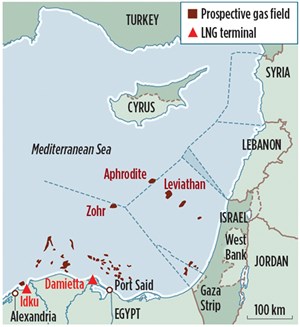Offshore in depth
With the ongoing turmoil in the Middle East, the refugee crisis, and terrorist attacks in Europe, it’s hard to find a bright spot in international affairs. Nonetheless, let me suggest one: the prospect of significant, new, natural gas production in the Eastern Mediterranean region is a strong economic incentive for better relations between Israel and Egypt. While some analysts have argued that the large Egyptian gas discovery announced by Eni in August could jeopardize the future of Israel’s Leviathan field, it is clearly in both countries’ best interests to take a cooperative approach.
Tamar breakthrough. Israel was an energy-poor nation until 2004, when Noble Energy delivered the country’s first domestic gas production from Mari-B field, which it discovered in 2000. In 2010, Noble found the much-larger Tamar field, with 10 Tcf of gas reserves, about 50 mi west of Haifa, and began production just two-and-a-half years later. The field now produces 1.0 Bcfd, meeting all of Israel’s natural gas demand and generating more than half of its electricity. Noble and its partner, Delek Group, also have signed letters of intent to sell excess Tamar gas to Egypt—through a pipeline that once flowed in the opposite direction—for Egyptian consumption and for export through the currently idle LNG plants at Damietta and Idku, Egypt.
In December 2010, Noble discovered Leviathan field, with estimated reserves of 22 Tcfg, 47 mi southwest of Tamar field. Production from the field was earmarked for export through the two Egyptian LNG plants. A plan for a subsea pipeline from Leviathan to Egypt was being considered, with production originally scheduled to be online in 2017.
However, in December 2014, Israel’s Antitrust Authority commissioner blocked Leviathan’s development, contending that Noble and Delek would have too dominant a share of Israel’s gas market, even after selling two smaller fields, Karish and Tanin. This controversy over a potential gas monopoly continued through 2015.
Egypt’s “supergiant” discovery. In August, Eni, announced what it described as a “supergiant gas field” discovery in the Mediterranean Sea. The Zohr field discovery well was drilled in 4,757 ft of water to a depth of 13,553 ft, and it encountered 1,312 ft of pay in a carbonate sequence. Based on results from the exploratory well and seismic data, Eni estimates that Zohr contains 30 Tcfg of recoverable reserves. Eni CEO Claudio Descalzi told Bloomberg that Zohr was among the top four gas finds of the past decade. The new field is near existing offshore infrastructure, and Eni expects it to be online in 2018.
While most of the Zohr production will be consumed domestically, some also will be available for export. Eni owns 40% of the LNG plants in Damietta and Idku. Gas from Zohr will compete with Israeli production, both in the Egyptian and export markets.
Gas industry framework. Prodded by the Egyptian find, Israeli officials developed a framework to enable development of Leviathan. The framework calls for Delek to sell its stake in Tamar, and for Noble to reduce its Tamar stake, and sell Karish and Tanin fields. The framework was approved by Prime Minister Netenyahu in August and was endorsed by the cabinet and Knesset. Israeli law requires the framework to be reviewed by the Knesset’s Economic Affairs Committee before it can be implemented.
Facing political opposition and public protests, Netenyahu took over responsibility for the Economic Ministry and is leading the framework proponents at the committee hearings that began in mid-November, and were slated to conclude on Dec. 10. With Israeli governmental approval, Leviathan’s project financing and final investment decision could be complete by year-end 2016.
Ample opportunity. Both Eni and the Egyptian energy ministry downplayed the Zohr discovery’s impact on Israel’s gas development prospects. Eni’s Descalzi emphasized that his company had been operating in Egypt since 1954, and that the new discovery would utilize existing infrastructure and make “a big Eastern Mediterranean hub.” Tarek el-Molla, Egypt’s Minster of Petroleum and Mineral Resources, told The New York Times that “Egypt is eligible to play a significant strategic role in the region.” Egypt’s LNG facilities could be used to export gas from Egypt, Israel and Cyprus. (Noble and Delek are working with Cyprus government to develop 5-Tcf Aphrodite field, although Turkey has claimed that the discovery is in its exclusive economic zone.)
At a recent financial analyst conference, Noble CEO David Stover pointed out that there will be more-than-enough demand for natural gas in the region through the next decade, to justify investment in both the Israeli and Egyptian projects. Domestic demand in Egypt, Israel and Cyprus; exports to Jordan and Turkey; and available capacity in the Egyptian LNG plants, combined, are expected to grow from 4 Bcfd in 2015 to 9 Bcfd in 2025. “What the Zohr discovery has done is to bring more interest in the demand curves and what gas is going to be needed,” Stover said. By working together, Israel and Egypt could give a strong boost to their respective economies while supplying energy to other countries. ![]()

- Applying ultra-deep LWD resistivity technology successfully in a SAGD operation (May 2019)
- Adoption of wireless intelligent completions advances (May 2019)
- Majors double down as takeaway crunch eases (April 2019)
- What’s new in well logging and formation evaluation (April 2019)
- Qualification of a 20,000-psi subsea BOP: A collaborative approach (February 2019)
- ConocoPhillips’ Greg Leveille sees rapid trajectory of technical advancement continuing (February 2019)



